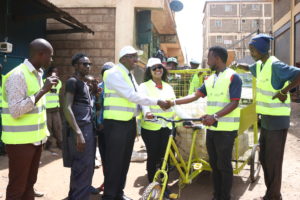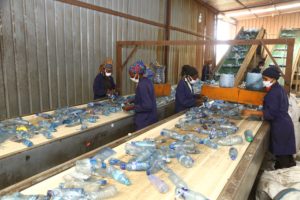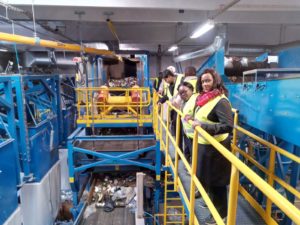Tap into the collective power of influential business and NGO pioneers to create new strategies and
tactics to build a more socially and environmentally conscious world.

Tap into the collective power of influential business and NGO pioneers to create new strategies and
tactics to build a more socially and environmentally conscious world.
Joyce Waweru
Company Name:
PET Plastic Recycling Kenya
Region, Country:
Africa, Kenya

 1. What is the mission of your company?
1. What is the mission of your company?
Our mission is to create value for post-consumer PET in Kenya – one industry, one consumer and one PET bottle at a time.
We seek to achieve this by:
a) Creating value for post-consumer PET
b) Inspiring a shift in consumer & industry behavior toward the recycling of PET
c) Porviding self-regulation of the PET industry.
2. What is the most innovative or environmentally/socially impactful project/practice your company/NGO has implemented?
The most innovative project we have implemented is the Kick-Start Project. It was implemented from November 2018 – March 2019 and cost $25,000. For this project, we partnered with Mr. Green Africa Trading Limited.
The Kick-Start project was an inception pilot project aimed at testing the impact of a price subsidy for recyclers as a driver for collection of PET bottles. The price subsidy model entails providing an amount of funds per kilogram of bottles collected and recycled to partner recyclers (Mr. Green Africa) which is then passed through to the collectors. Prior to the pilot project Mr. Green Africa was paying USD 0.12 per kilogram of bottles, but with the subsidy it was USD 0.19 per kilogram. Most waste collectors collect an average of 100 – 300 kilograms per day. In Nairobi, daily wages often range from USD 2 to 10 per day. Through this project we were able to raise it to about USD 19 – 30.
PETCO Kenya provided a price boost of KES 5 per kilogram of collected post-consumer bottles, that are recycled into PET flakes by Mr. Green Africa Limited. We contracted the company for the collection and recycling of 500 tonnes.
Mr. Green Africa was selected as a preferred partner for the implementation of the kick- start project due to their proven track of creating direct impact to waste collectors at the bottom of the value chain though their decentralized collection centres.
PETCO donated personal protective equipment and a collection tricycle to waste collectors who currently service Mr. Green Africa. In Kenya, as in most emerging and developing nations, waste collectors often use gurney bags to collect their waste which often causes back problems for the collectors, who will often take off-days leading to a loss of income.
Link: https://www.mrgreenafrica.com/
3. How have those projects positively impacted the local community and/ or your country?
 At the onset of the project we envisaged that we would be able to stimulate the collection of rPET bottles to an average 17 tonnes per month up from the 6-8 tonnes per collection centre. We were able to achieve this scale and in the first month of implementation, the project saw a 60% increase in over 70% of the collection centres where Mr. Green Africa provided the subsidy. This led to a reduced number of PET bottles in the natural environment in the areas where the project was implemented.
At the onset of the project we envisaged that we would be able to stimulate the collection of rPET bottles to an average 17 tonnes per month up from the 6-8 tonnes per collection centre. We were able to achieve this scale and in the first month of implementation, the project saw a 60% increase in over 70% of the collection centres where Mr. Green Africa provided the subsidy. This led to a reduced number of PET bottles in the natural environment in the areas where the project was implemented.
PETCO was able to transfer capital to the recycler and the waste collectors, this led to increased revenues for both parties. The transfer of capital at the bottom of the pyramid is critical in Kenya as this is a segment of the population that pays a premium with respect to accessing services and goods compared to the other segments. The increased revenue allows the collectors to be able to have some funds that they can set aside as savings.
4. Please share any new projects you will be implementing in the near future.
We will be implementing the Leave No Bottle Behind Campaign.
In 2019, PETCO received a grant to implement and promote collection of post-consumer PET bottles from Coca-Cola through their World Without Waste program. As a member of PETCO, Coca-Cola sought PETCO to implement this project due to its strong network with recyclers of the products.
This project is part of a larger program financed by the grant dubbed “leave no bottle behind” that brings together multiple stakeholders inter alia – Nairobi City County Government, UN Habitat, UN Environment, The National Environment Management Authority, the Ministry of Environment and Forestry in order to stimulate collection of post- consumer PET bottles in the Nairobi county.
To this end, PETCO has signed recycling contracts with high capacity recyclers, where PETCO is offering a price subsidy per kilogram of PET bottles collected and recycled. Our current partners are: WEECO Recycling Company Limited, Karsam Limited and T3 Limited.
PETCO targets to ensure that 6,000 tonnes of post-consumer PET bottles are collected by 31st December 2019. Through this partnership with SHOFCO (Shining Hope for Communities) and PETCO KENYA targets to collect and recycle 1,000 tonnes of PET bottles this year as well as create jobs for the hundreds of collectors who will participate in the project. SHOFCO and PETCO will establish buy-back centres within the unserved communities of Kibera which currently hosts a population of 1 million Kenyans who have no access to waste disposal infrastructure. Through these projects we envisage that over 1,000 young men and women will benefit from the SHOFCO – PETCO partnership. These young men and women currently provide waste collection services in low -income and unserved areas such as Kibera Slum, Kayole, Dandora, Mukuru Kwa Njenga, Kawangware etc. We will be supplying 120 collection carts to the groups to assist them in their collection activities.
Further, as part of this campaign PETCO is also partnering with the Nairobi City County Government (NCCG), to pilot some neighborhood buy-back centres where consumers can drop or sell off their recyclables. These centres are being negotiated by PETCO and will be operated by our recycling partners. It is envisaged that this project will answer the question all consumers have been asking us – where do I take my recyclables to once I have gathered them in my house?
5. What are your top 3 career accomplishments?

6. What inspired you to choose your career path?
I was, and am, inspired by a desire to make a difference in the way business and industry approach sustainability by demonstrating its business case. The desire to have people, planet and business co-exist is inspirational to me.
7. Personally—Why do you care about sustainability? What is your story?
It started when I was young, about 12 years old, when my mother and I were having a conversation one day in the living room and I said to her, I want to work in a job that allows me to make money and make a positive impact in lives at the same time. She said, like an Environmentalist? Doctor? And I asked her – what does an environmentalist do? She said I believe something along the lines of what you want, except their focus is on the environment (that was her definition). At the time, I only knew one person who was a worked in this area and this person was working for the United Nations. I connected to it as a career, and that was the beginning of my journey.
8. What is/are the biggest incentive(s) for businesses in your country to adopt sustainable practices?
Currently, it is compliance or cost-savings with respect to their bottom lines especially for those who have adopted improved energy efficiency, use of recycled content in their production, and use of renewable energy solutions. However, today, with consumers demanding more action from the various brands they purchase, the adoption of sustainable practices is improving the brand value for businesses. We have also seen numerous businesses that are looking to raise funds either through private equity or through multilateral lending adopt sustainable practices so that they can leverage sustainability to access financing.
9. What is/are the biggest environmental or social challenge(s) facing your country today?
The biggest environmental challenges are climate change, which leads to drought, flooding, and an increase in the spatial area where vector borne diseases are being experienced. Another big environmental challenge Kenya is facing is poor waste management. This is largely due to the lack of adequate or efficient disposal systems.
The most pressing social challenges are high unemployment rates– we currently have a huge population of young men and women who are not engaged in education or meaningful work – this has led to a lot of disenfranchisement of this segment, who have turned to drugs, crime, gambling. The rates of depression are currently on the rise in the age cohort of 18 – 35 years. Another pressing social challenge is the lack of adequate integration of young people in the governance and policy making processes in our nation. This has caused a lot of apathy with that generation.
Keep up with Joyce Waweru and PETCO Kenya on social media:
Joyce Waweru: LinkedIn